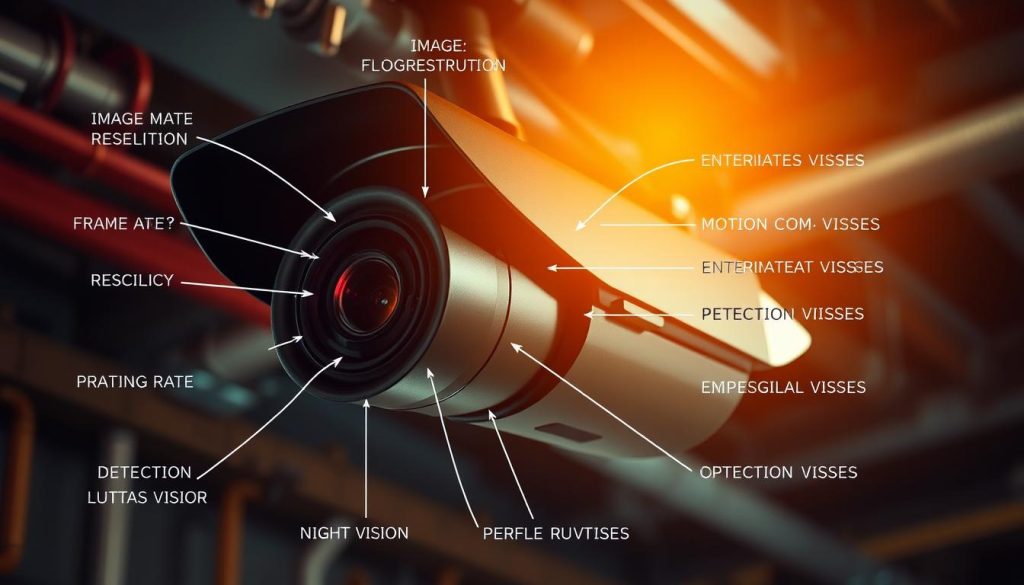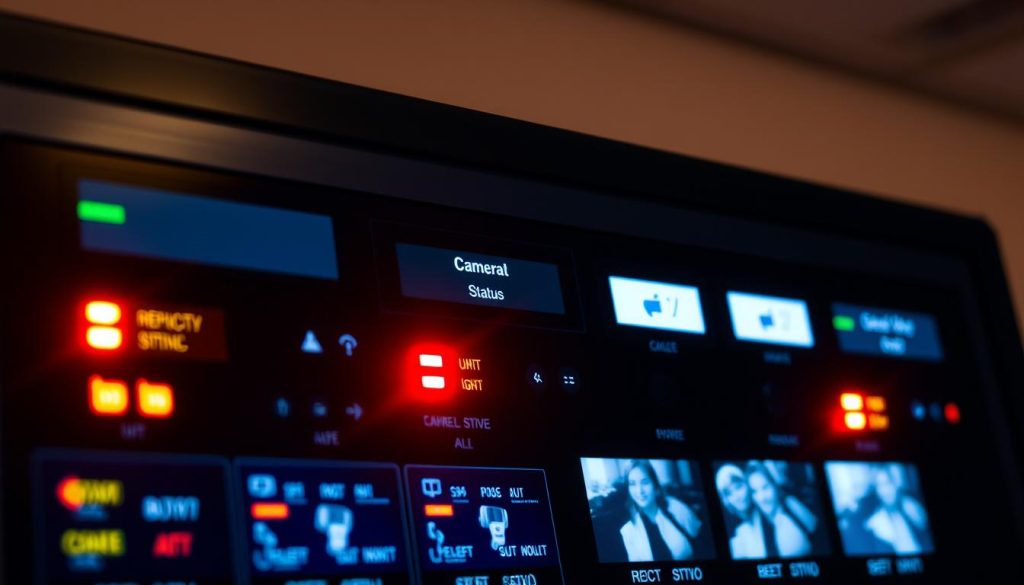Knowing if your CCTV is recording is key to a good surveillance system. As security worries grow, it’s important to check if your cameras are working. We’ll look at signs, sounds, and technical ways to tell if your cameras are recording.
By learning these signs, you’ll feel more sure about your security setup.
Key Takeaways
- Understanding CCTV recording status is essential for effective surveillance.
- Visual and auditory indicators can help verify camera functionality.
- Regular checks enhance security and peace of mind.
- Familiarity with camera settings aids in confirming recording status.
- Technical methods can provide additional assurance of recording.
Understanding CCTV Functionality
CCTV systems are key to improving security by watching over areas. They capture video, which helps in monitoring sensitive spots. Some cameras can even record sound, making them more effective.
To work well, CCTV systems need a steady power source. This keeps cameras ready to record at all times. Users can pick from different recording styles, like:
- Continuous recording: This captures everything without stopping.
- Motion detection: It only records when it sees movement, saving space and making it easier to find key moments.
Understanding these features helps users get the most out of their systems. It leads to better security management by knowing how these parts work together.
Typical Indicators of Recording Status
Knowing if your CCTV system is recording is key for security and peace of mind. There are clear signs to check if your camera is working. These signs include different lighting patterns and camera behaviors that show if it’s recording.
Looking for Blinking LED Lights
Blinking LED lights are big CCTV recording indicators. The color and pattern can change based on the camera’s type. For example, a steady blue light might mean it’s recording. A red light could mean it’s ready to record or in standby.
Knowing these signals helps users check their CCTV system quickly.
Monitoring Camera Movement
Camera movement is another way to see if it’s working. Cameras with pan-and-tilt features show camera movement signals. This means they’re powered and might be recording.
When cameras move, it shows they’re working and ready to watch. This makes users feel more secure about their surveillance.
Methods to Verify if Your CCTV is Recording
To make sure your security system works right, you need to check if it’s recording. There are a few ways to see if your cameras are capturing video. You can use live view software or listen for sounds from the cameras.
Checking Live View on Security Software
Looking at the live view on your security software lets you see what your cameras are capturing in real time. This way, you can watch what’s happening and know your system is working. If you see the feed without any problems, it means your CCTV system is likely working well.
Many security apps are easy to use. They help you manage your camera feeds and check if they’re recording.
Listening for Operational Sounds
CCTV cameras make operational sounds when they’re working, like motor noises or clicks when changing angles. These sounds can tell you if the camera is recording. Listening for these noises and watching the camera’s actions can help you trust your system more.
How do I know if my CCTV is recording?
To confirm if your CCTV is recording, you need to use different methods. Look for blinking LED lights, which often mean the system is working. Also, check the live view on your security software to see if cameras are active.
Another way is to listen for sounds from the cameras. Some cameras make noise when they’re on, showing they’re working right. Knowing how your CCTV system works helps you solve any problems you might face.
By using these methods, you can keep a close eye on your security. This makes sure your surveillance system is always ready to protect your space.
Using Technical Devices to Check Recording Status
Ensuring your CCTV system records correctly is key. Technical devices help verify this. You can use electronic bug detectors and check power indicator lights.
Electronic Bug Detectors
Electronic bug detectors are great for finding hidden cameras. They detect the signals from these cameras, showing if they’re working. Using bug detectors keeps your space safe from unwanted surveillance.
Observing Power Indicators
CCTV systems often have power indicator lights. A green light means everything is working right. But a red light could mean trouble or that it’s not recording. Spotting these lights helps avoid security problems.
Camera Settings and Configurations
Knowing the right CCTV camera settings is key for a good security system. It lets users adjust their surveillance to fit their needs. Important settings include choosing between continuous recording and motion detection, and adjusting sensitivity levels.
Accessing the camera’s control panel or mobile app gives users important info. They can change recording modes and check stored footage settings. This helps users get the most out of their CCTV system.
Knowing how to use these operational configurations makes a security system more reliable. Regularly checking and updating camera settings boosts surveillance effectiveness. For more tips, check out this useful guide on setting up CCTV systems for better security.

Troubleshooting Non-Recording Cameras
When CCTV cameras don’t record, a step-by-step approach can help find and fix the problem. Often, simple things can stop cameras from recording. Checking power connections and resetting the camera can solve many issues. Also, keeping the software updated is key for it to work well.
Ensuring Power Connectivity
First, check if your CCTV system’s power is connected right. Make sure all cables are plugged in well. For wireless cameras, check if they’re connected to the network. A small power issue can stop recording. Also, check if there were any power outages or problems.
Restarting the Camera
Try restarting the camera as a first step. This can fix small problems and get it working again. If restarting doesn’t work, you might need to look into hardware or software issues.
Checking Firmware Updates
Keeping your CCTV system’s firmware up to date is important. Old software can cause recording problems. Check if your firmware is current and update it if needed to keep everything running smoothly.
Distinguishing Between Fake and Real Cameras
Knowing if your CCTV is real or fake can really boost your security. Real cameras usually have wires and signs that show they’re working. Fake ones might not have these important features.
To tell the difference, try searching online for the camera’s brand. Many well-known makers have ways to check if their products are real.
Using these steps can help you know for sure if your cameras are genuine. Having real CCTV means better security and reliable monitoring of your space.
Exploring Different Recording Modes
Understanding CCTV recording modes is key to a good surveillance system. Two main modes are continuous recording and motion detection. Each has its own benefits for different security needs.
Continuous Recording vs. Motion Detection
Continuous recording captures everything, making it great for big areas. It’s perfect for places needing constant watch, like stores or secure zones. It gives a full view of what happened, helping in investigations.
Motion detection saves space by only recording when there’s movement. It’s best for places with little activity. It helps keep security high while saving resources.
Choosing the right recording mode depends on your security needs and camera abilities. Both continuous and motion detection are useful for better security.
Importance of Regularly Checking Your CCTV System
Regular CCTV checks are key to keeping your surveillance system running smoothly. By checking your CCTV setup regularly, you can spot and fix any problems quickly. This keeps your system working well and boosts your security.
It’s important to check recording statuses, camera settings, and firmware updates often. These checks help find issues before they become big problems. This way, you know your cameras are always ready to capture important moments.
Being diligent with CCTV checks is essential for a good surveillance system. It keeps your property safe and watched over, ready to face any threats.

